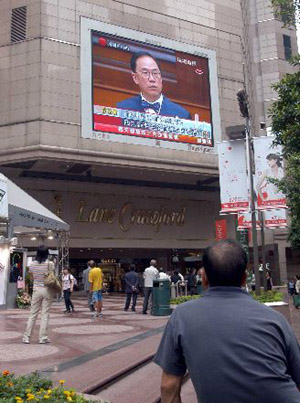| Tools: Save | Print | " target="_blank" class="style1">E-mail | Most Read |
| Chief Executive Delivers Hong Kong Policy Address |
| Adjust font size: |
|
Economic development, wealth creation and improving the livelihoods of people would top the Hong Kong Special Administration Region (HKSAR) government's agenda in the coming year, said Chief Executive Donald Tsang. Tsang outlined the government's priorities and strategies on issues such as the economy, environment and education while highlighting three future challenges in the 2006-07 Policy Address at the Legislative Council Wednesday morning. The annual speech entitled "Proactive, Pragmatic and Always People First" is Tsang's second and last Policy Address for his term of office after becoming chief executive of the HKSAR in June 2005. Tsang said central government had continued to provide strong support to Hong Kong over the past year with new measures being introduced in trade and commerce, professional services and facilitation of investment under the CEPA framework which is a free-trade deal between Hong Kong and the Chinese mainland. "If Hong Kong is to embrace the era of globalization our primary task must be to find an appropriately important role in the development of our country," Tsang said. Adapting to globalization and integrating with the mainland weren't two contradictory paths for Hong Kong's development, he commented. Tsang said the National 11th Five-Year Plan clearly stated that the central government would support Hong Kong's development in several areas including financial services, logistics, tourism, information services and the maintenance of their status as an international center of financial services, trade and shipping. "This recognizes our dominant industries and their important function in our country's development," Tsang said. "Hong Kong's role is unique and irreplaceable among all the cities in China." Tsang explained in detail how the HKSAR government should approach environmental protection in the region. He said Hong Kong must adopt a forward-looking strategic approach by setting improvement goals for different stages while allowing for future new technology-induced improvements. Tsang said Hong Kong must adhere to the "polluter pays" principle and that proper disposal of waste entailed substantial expenditure. He explained the emission caps on power plants at Castle Peak, Black Point and Lamma Island would be progressively tightened to meet the 2010 emission reduction targets. "We shall not allow these firm targets to be compromised in any way," he said. He proposed in the Policy Address that the HKSAR government spend HK$3.2 billion to provide an incentive for the early replacement of 74,000 pre-Euro and Euro I diesel commercial vehicles with Euro IV vehicles. In the Policy Address he also clarified his recent remarks on pragmatic politics and the philosophy of public finance which have aroused some public discussion. Tsang said,"some people mistook our stopping to use the term 'positive non-interventionism' as a shift or a U-turn in our policy. "This is not the case," he said. "For the sake of effective governance I've always believed that we have to keep our feet firmly on the ground and not be hamstrung by ideology or slogans." Tsang outlined three challenges Hong Kong must deal with in the future -- how to sustain economic growth, how to further develop a democratic political system and how to build a harmonious society. On the democratic development of the HKSAR political system Tsang said the SAR government had continued in its endeavors to move toward universal suffrage. He said the HKSAR government would make all the necessary preparations for the elections of the Election Committee and the chief executive scheduled in December 2006 to ensure they'd be carried out smoothly according to the law in an open and equitable manner.
(Xinhua News Agency October 11, 2006) |
| Tools: Save | Print | " target="_blank" class="style1">E-mail | Most Read |
 |
| Related Stories |

